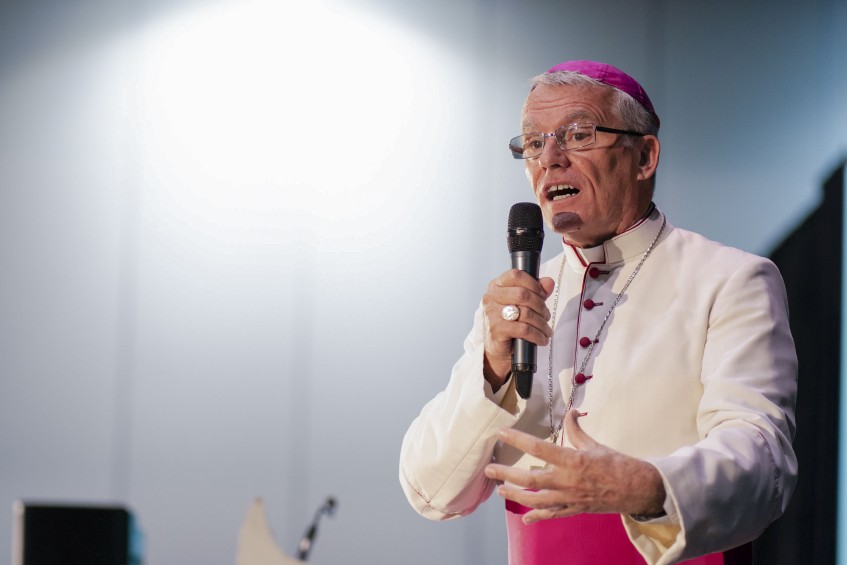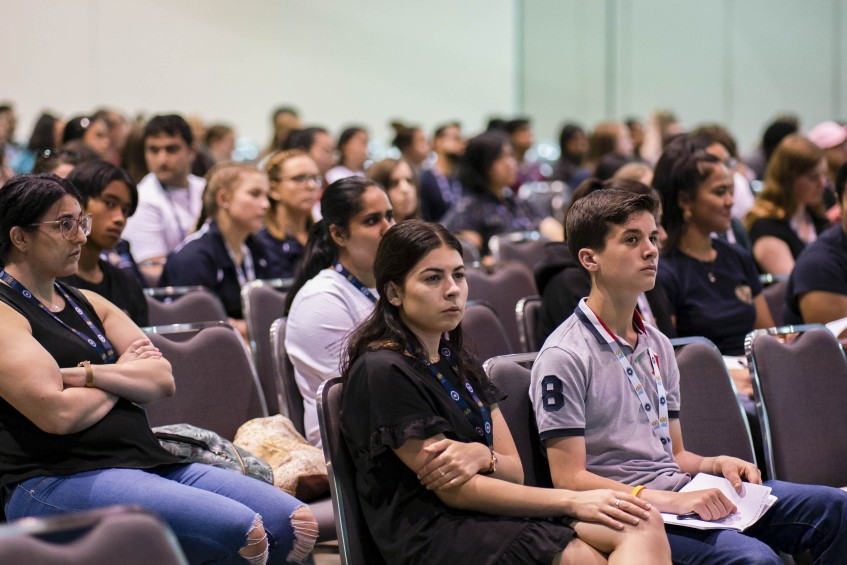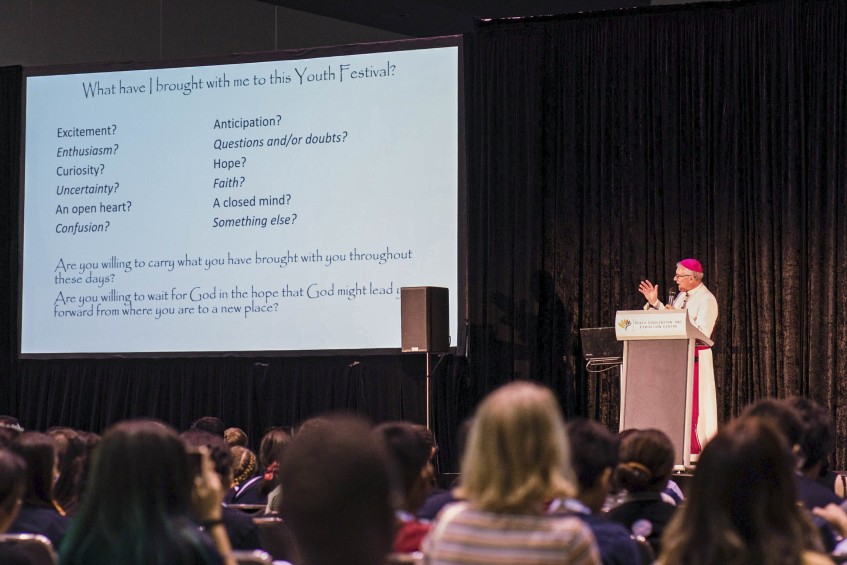God is interested in every one of us: Archbishop Costelloe

Archbishop Timothy Costelloe SDB shares a moment from his personal testimony with the pilgrims. Photo: Iceberg Media.
The young pilgrims gathered with a sense of respect and expectation on Day Two to hear Archbishop of Perth, Timothy Costelloe SDB, give his workshop address at the Australian Catholic Youth Festival 2019: Listening to God, how do we know what God is saying?
“I am absolutely convinced that nothing about the Catholic Church will ultimately make any sense at all unless it is looked at as being, in one way or other, connected to Jesus – and, as Pope Francis would remind us, not a Jesus who is simply a great man from the distant past who left a great legacy behind him, but a person who is still alive today, who is interested in us, who wants to be involved in our life, and who wants to help us live our life to the full.
“The Catholic tradition of Christianity, before it is about anything else, is about Jesus, Jesus alive, Jesus among us, Jesus calling to us, Jesus inviting us to be his followers, his disciples, his friends,” Archbishop Costelloe explained.
“He is someone who wants to walk with us, lift us up when we are struggling, sit with us when we are alone or afraid, and celebrate with us when we are happy.
“In all this he wants to say to us: your life matters, you matter, and I want to help you live your life as fully, and deeply, and enthusiastically, and fruitfully as you can – that’s why I gave you the gift of life in the first place.”

Archbishop Timothy Costelloe SDB drew a full crowd to the workshop to hear his presentation on practical faith in the theme of Plenary Council 2020. Photo: Iceberg Media.
Addressing one of the greatest challenges of today, he explained that the moral positions the Church upholds, sometimes in the face of great opposition and hostility, make no ultimate sense if they are just seen as arbitrary rules to follow, rather than essential aspects of what it means to be a follower of Jesus.
“Our liturgy, our prayer traditions, our social outreach efforts, our concern for justice and the environment, our moral traditions and teachings - they all point to Christ and flow out from Christ and we won’t make sense of them, or find them compelling, or trust them, until we begin to make sense of Jesus, and find him compelling, and begin to trust him,” he said.
“In the end this is what the ACYF is about.”
Archbishop Costelloe explained that God is interested in every one of us: God has a plan, a project, for each of one of us; and in the process of discovering what God is asking of us and where he is leading us, we are actually discovering the path that will bring us to the fullness of life that God had planned when he created us.
“We are free to truly become ourselves as we were meant to be.
“Remember, we are all different, we are all unique, we are all in particular ways blessed by God with different gifts, different capabilities, different personalities. You are not supposed to be like me any more than I am supposed to be like you.”
“We are who we are as God created us,” he said.
“Part of this process of deciding, this discernment about your future, will require you to truly know yourself. What are your strengths? What are your limitations? What is your heart telling you about your deepest desires? What makes you smile? What makes you feel proud of yourself?”
“My conviction is that God does speak to us in all these questions – and the answers we are able to give to them.”

Archbishop Timothy Costelloe SDB presents the workshop Listening to God: how do we know what God is saying? Photo: Iceberg Media.
He explained that the challenge is to find ways of creating spaces in our lives, physical spaces and mental spaces, where we can actually consider all these questions, sit quietly with them, talk calmly and deeply with people we trust about them, and somehow or other bring them with us when we turn to God – and then wait patiently for God to show us a way forward.
“We all make mistakes, or course, and sometimes very bad ones. Lots of people make decisions which bring great suffering to them and to many others. We can’t pretend that this isn’t true and we know that sometimes we have no choice other than to accept the consequences for our actions.
“These consequences aren’t signs of an angry God punishing us – they are simply the inevitable result of what we may have done or failed to do. God respects our freedom, including the freedom to make bad choices that bring us suffering,” the Archbishop explained.
“Even when we don’t do this, and most of us fail much of the time, God doesn’t give up on us, or walk away.”
He shared with the youth that nothing we do, no mistake we make, can ultimately frustrate God’s plans to bring us to happiness.
“The only way we can do that is to stubbornly and persistently and deliberately turn our backs on God and decide that that is the way we like it and nothing will convince us otherwise.”
